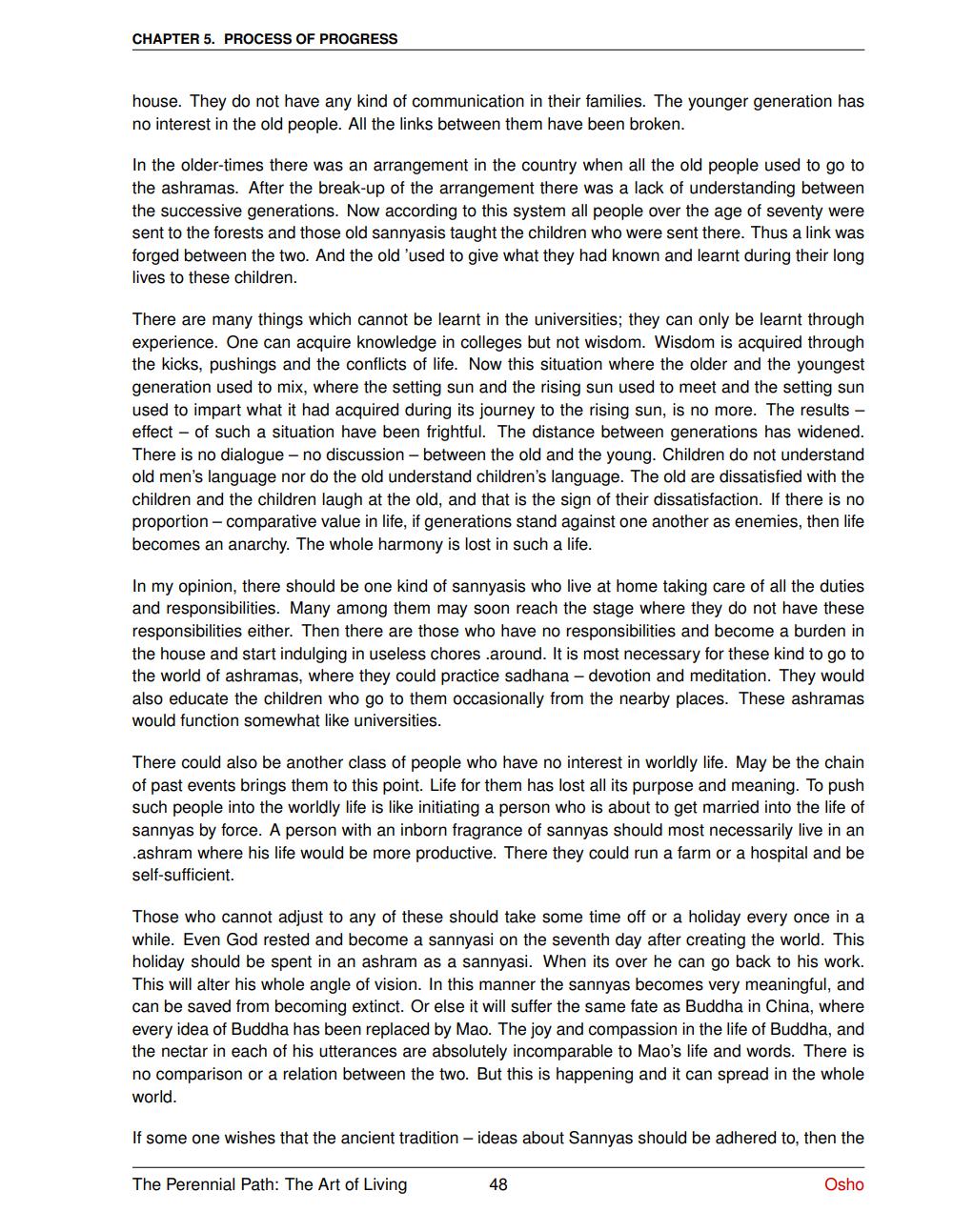________________
CHAPTER 5. PROCESS OF PROGRESS
house. They do not have any kind of communication in their families. The younger generation has no interest in the old people. All the links between them have been broken.
In the older-times there was an arrangement in the country when all the old people used to go to the ashramas. After the break-up of the arrangement there was a lack of understanding between the successive generations. Now according to this system all people over the age of seventy were sent to the forests and those old sannyasis taught the children who were sent there. Thus a link was forged between the two. And the old 'used to give what they had known and learnt during their long lives to these children.
There are many things which cannot be learnt in the universities; they can only be learnt through experience. One can acquire knowledge in colleges but not wisdom. Wisdom is acquired through the kicks, pushings and the conflicts of life. Now this situation where the older and the youngest generation used to mix, where the setting sun and the rising sun used to meet and the setting sun used to impart what it had acquired during its journey to the rising sun, is no more. The results - effect of such a situation have been frightful. The distance between generations has widened. There is no dialogue - no discussion - between the old and the young. Children do not understand old men's language nor do the old understand children's language. The old are dissatisfied with the children and the children laugh at the old, and that is the sign of their dissatisfaction. If there is no proportion - comparative value in life, if generations stand against one another as enemies, then life becomes an anarchy. The whole harmony is lost in such a life.
In my opinion, there should be one kind of sannyasis who live at home taking care of all the duties and responsibilities. Many among them may soon reach the stage where they do not have these responsibilities either. Then there are those who have no responsibilities and become a burden in the house and start indulging in useless chores around. It is most necessary for these kind to go to the world of ashramas, where they could practice sadhana - devotion and meditation. They would also educate the children who go to them occasionally from the nearby places. These ashramas would function somewhat like universities.
There could also be another class of people who have no interest in worldly life. May be the chain of past events brings them to this point. Life for them has lost all its purpose and meaning. To push such people into the worldly life is like initiating a person who is about to get married into the life of sannyas by force. A person with an inborn fragrance of sannyas should most necessarily live in an .ashram where his life would be more productive. There they could run a farm or a hospital and be self-sufficient.
Those who cannot adjust to any of these should take some time off or a holiday every once in a while. Even God rested and become a sannyasi on the seventh day after creating the world. This holiday should be spent in an ashram as a sannyasi. When its over he can go back to his work. This will alter his whole angle of vision. In this manner the sannyas becomes very meaningful, and can be saved from becoming extinct. Or else it will suffer the same fate as Buddha in China, where every idea of Buddha has been replaced by Mao. The joy and compassion in the life of Buddha, and the nectar in each of his utterances are absolutely incomparable to Mao's life and words. There is no comparison or a relation between the two. But this is happening and it can spread in the whole world.
If some one wishes that the ancient tradition - ideas about Sannyas should be adhered to, then the
The Perennial Path: The Art of Living
48
Osho




